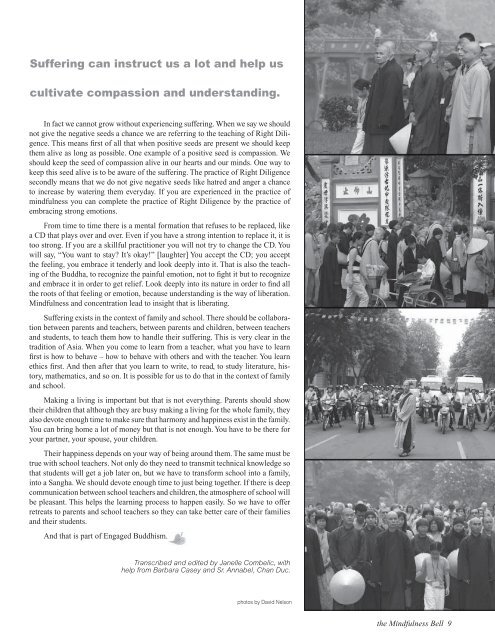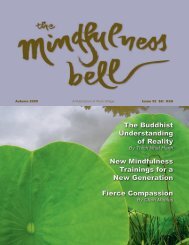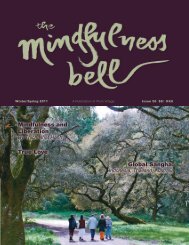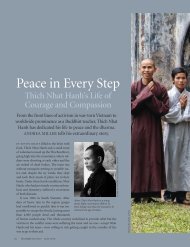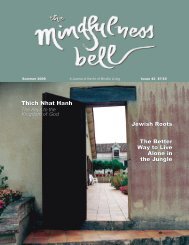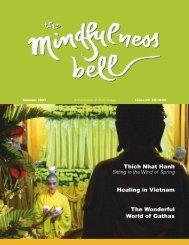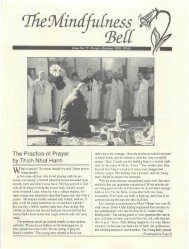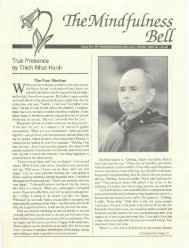Download - The Mindfulness Bell
Download - The Mindfulness Bell
Download - The Mindfulness Bell
You also want an ePaper? Increase the reach of your titles
YUMPU automatically turns print PDFs into web optimized ePapers that Google loves.
dharma TALK<br />
Suffering can instruct us a lot and help us<br />
cultivate compassion and understanding.<br />
In fact we cannot grow without experiencing suffering. When we say we should<br />
not give the negative seeds a chance we are referring to the teaching of Right Diligence.<br />
This means first of all that when positive seeds are present we should keep<br />
them alive as long as possible. One example of a positive seed is compassion. We<br />
should keep the seed of compassion alive in our hearts and our minds. One way to<br />
keep this seed alive is to be aware of the suffering. <strong>The</strong> practice of Right Diligence<br />
secondly means that we do not give negative seeds like hatred and anger a chance<br />
to increase by watering them everyday. If you are experienced in the practice of<br />
mindfulness you can complete the practice of Right Diligence by the practice of<br />
embracing strong emotions.<br />
From time to time there is a mental formation that refuses to be replaced, like<br />
a CD that plays over and over. Even if you have a strong intention to replace it, it is<br />
too strong. If you are a skillful practitioner you will not try to change the CD. You<br />
will say, “You want to stay It’s okay!” [laughter] You accept the CD; you accept<br />
the feeling, you embrace it tenderly and look deeply into it. That is also the teaching<br />
of the Buddha, to recognize the painful emotion, not to fight it but to recognize<br />
and embrace it in order to get relief. Look deeply into its nature in order to find all<br />
the roots of that feeling or emotion, because understanding is the way of liberation.<br />
<strong>Mindfulness</strong> and concentration lead to insight that is liberating.<br />
Suffering exists in the context of family and school. <strong>The</strong>re should be collaboration<br />
between parents and teachers, between parents and children, between teachers<br />
and students, to teach them how to handle their suffering. This is very clear in the<br />
tradition of Asia. When you come to learn from a teacher, what you have to learn<br />
first is how to behave – how to behave with others and with the teacher. You learn<br />
ethics first. And then after that you learn to write, to read, to study literature, history,<br />
mathematics, and so on. It is possible for us to do that in the context of family<br />
and school.<br />
Making a living is important but that is not everything. Parents should show<br />
their children that although they are busy making a living for the whole family, they<br />
also devote enough time to make sure that harmony and happiness exist in the family.<br />
You can bring home a lot of money but that is not enough. You have to be there for<br />
your partner, your spouse, your children.<br />
<strong>The</strong>ir happiness depends on your way of being around them. <strong>The</strong> same must be<br />
true with school teachers. Not only do they need to transmit technical knowledge so<br />
that students will get a job later on, but we have to transform school into a family,<br />
into a Sangha. We should devote enough time to just being together. If there is deep<br />
communication between school teachers and children, the atmosphere of school will<br />
be pleasant. This helps the learning process to happen easily. So we have to offer<br />
retreats to parents and school teachers so they can take better care of their families<br />
and their students.<br />
And that is part of Engaged Buddhism.<br />
Transcribed and edited by Janelle Combelic, with<br />
help from Barbara Casey and Sr. Annabel, Chan Duc.<br />
photos by David Nelson<br />
the <strong>Mindfulness</strong> <strong>Bell</strong> 9


